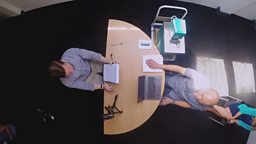What can I do if my body clock is out of sync with my daily routine?
Some of us are ‘morning larks’, who prefer to be up early, and some of us are ‘night owls’, who feel more alert later in the day. For many of us, the time of day we’re expected to be at work does not fit in with our body’s natural rhythm of sleeping and waking.
This can result in us getting fewer hours sleep than we really need. Scientific evidence suggests that long-term sleep deprivation is not good for our health. It has been linked with an increased risk of cancer and heart disease, and it’s thought that every hour’s difference between your body’s natural rhythm and your actual daily routine increases the risk of obesity by up to 30%.
So why do these differences occur, and what can we do about them?
Web exclusive: Doctor Russell Foster tells us why our body clocks change with age

Why does your body clock change with age?
As we age, so do our body clocks. Doctor Russell Foster tells us why.
Everybody has what is known as a chronotype, which determines what time of day we are most alert. This is set by a part of the brain called the suprachiasmatic nucleus, which acts as our ‘master body clock’ and sets our daily rhythm. It is known to vary depending on gender and age.
Recent research suggests that our hormone levels may help explain this change. Testosterone, which rises sharply in teenage boys and declines as men grow older, has been shown in animal studies to impact on the ‘master body clock’. This might explain teenagers’ generally later chronotype compared to adults.
Similarly, the hormone changes that occur as we age may explain why we are more likely to wake up earlier as we get older..
For most of us, however, the timing of our working day stays roughly the same throughout our entire lives. So what can we do to help us cope with the inevitable disconnect between our chronotype and our daily routine?
In some schools, experimental timetables, designed to fit teenagers’ chronotype, are being trialled. By starting classes at lunchtime and finishing late, some early indications from Hampton Court House Sixth Form are that pupils are more productive.
For most of us, shifting our work day in this way is simply not possible. However, there are ways to encourage our body clock to be more closely aligned with our daily routine. These include:
Your body clock is re-set by light, so make sure you’re exposed to natural daylight as soon as you can in the morning.
Keep getting up at the same time every day, even on weekends.
In the hour before bed, avoid screens such as phones, laptops and tablets.





























